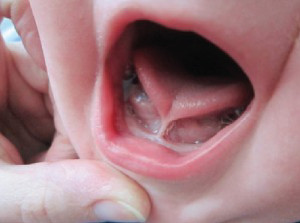Tongue tie division in babies and infants
A tongue tie is a membrane that extends from the underside of the tongue, in the middle, to the bottom of the inside of the mouth. The picture below shows a more severe tongue tie with the membrane extending right to the tip of the tongue. The picture shows an apparently milder tongue tie.
Many tongue ties are minor and do not require treatment. However a tongue tie that is interfering with breast feeding may require assessment with a view to possible treatment (frenotomy). Some bottle fed babies will also benefit from tongue tie release. The assessment should be carried out by someone with experience in this field.
Can my baby breast feed with a tongue tie?
Some can, some manage OK, some find it difficult, and some can’t. Some babies also have trouble bottle feeding and may dribble excessively, or swallow too much wind. The difficulties a baby is having do not always depend on the visual appearance of the tongue tie.
What are the symptoms of a tongue tied baby?
Sometimes mothers will experience painful feeding, damage to the areola or nipple, or even mastitis. Babies may latch on poorly, require several attempts to latch and become frustrated. They may make a clicking noise when feeding. Feeding may be prolonged, and the baby may still be hungry and be irritable, or be ready to feed again within an hour or two. Some babies can have continuous feeding cycle. Some babies have problems with excessive wind and may be in pain or suffer from vomiting as a result of swallowing wind. These are some of the more common symptoms of a tongue tie causing problems with breast feeding.
The baby who had the severe form of tongue tie in the image above was not having as many problems feeding as the baby with the milder form of tongue tie. Both improved with their feeding after division was performed. A tongue tie may not look dramatic, but may still be causing significant restriction of tongue movement.
Will it affect my baby’s speech later on?
Again it depends, but most tongue ties won’t affect speech. However since they are much simpler to treat when a baby is young, it may be better to have treatment if, for example, there is a family history of speech difficulties related to tongue tie.
Who can treat it?
The procedure, which is called a frenotomy, is safe in the hands of those who are trained and are able to administer pain relief and deal with any unexpected issues. A medical assessment by a paediatrician is an important part of the check-up, as parents may also wish to discuss other health concerns and feeding issues about their baby.
Why do some doctors and midwives think tongue ties are not important?
Nowadays we aim to promote breastfeeding much more strongly than in the past, because of the health benefits to the baby and to the mother. Our knowledge on what makes babies breastfeed successfully has also increased. As a result there is more evidence that the presence of a tongue tie can interfere with feeding. The National Institute for Health and Clinical Excellence (NICE) have stated that division of tongue tie may be beneficial, and there is a parent information sheet to read.
How is it treated?
Tongue tie release is carried out by carefully cutting the tongue tie under the tongue. It is a quick procedure and your baby will be able to feed immediately afterwards. Sometimes there may be a small amount of bleeding, but this stops after a minute or so in most cases. Treatment decisions should not be based solely on the information in these pages and should always be discussed firstly with your GP, midwife, infant feeding advisor or Paediatrician.
Tongue Tie Specialist
Dr. Vinit Shah, Consultant Paediatrician can assess your baby’s feeding difficulties and perform division of the tongue tie, if required, during the same visit. It does not require any special after care and you can continue to breast feed. It is an out patient procedure and does not require your baby to go to an operation theatre.
What if I don’t have private health insurance?
You don’t need to have private health insurance to be seen, and you can book and pay for a private consultation directly. A single appointment is all that is usually required to examine and treat your baby’s tongue tie. If your child has or may have symptoms of feeding difficulties and vomiting and you would like to make a private appointment to find out more, please contact me
Appointments
If you would like to make an appointment for a tongue tie division in babies consultation, please contact us

